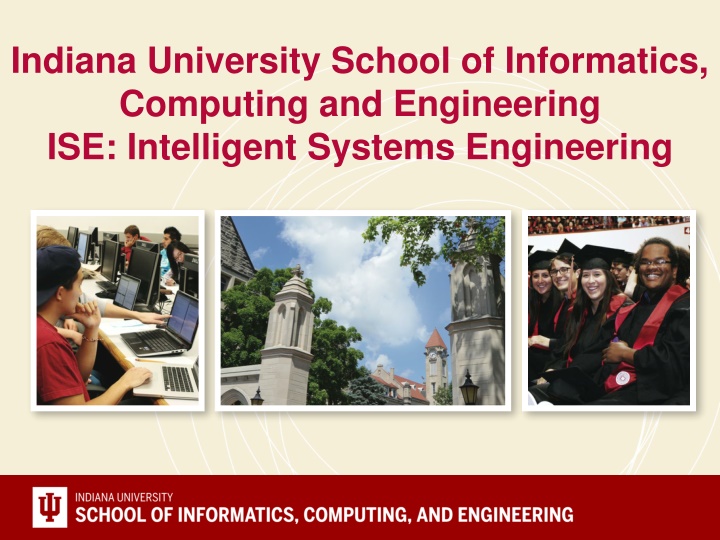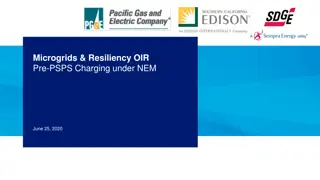Public Safety Power Shutoff (PSPS) Funding Overview
The Public Safety Power Shutoff (PSPS) Funding program aims to enhance resiliency and protect public safety in response to utility-led PSPS actions. It allocates funds to state agencies, counties, cities, and tribes for equipment purchases, preparedness, and response to PSPS events. Funding conditions require collaboration among counties and cities to support critical infrastructure, focusing on public safety and vulnerable communities.
Download Presentation

Please find below an Image/Link to download the presentation.
The content on the website is provided AS IS for your information and personal use only. It may not be sold, licensed, or shared on other websites without obtaining consent from the author.If you encounter any issues during the download, it is possible that the publisher has removed the file from their server.
You are allowed to download the files provided on this website for personal or commercial use, subject to the condition that they are used lawfully. All files are the property of their respective owners.
The content on the website is provided AS IS for your information and personal use only. It may not be sold, licensed, or shared on other websites without obtaining consent from the author.
E N D
Presentation Transcript
Indiana University School of Informatics, Computing and Engineering ISE: Intelligent Systems Engineering
What is Intelligent Systems Engineering? We define Intelligent Systems as purpose-engineered systems from the raw hardware and embedded systems, through data acquisition and signal processing to the transformation of data into decisions and/or knowledge. Creating a new program ab initio offers us the opportunity to focus on a modern set of engineering topics: those that involve intelligent systems as realized with embedded, customizable computing components combined with sophisticated data interpretation This program will train students in the practical engineering of systems with an emphasis on hands-on designing, simulating ( digital twin ) and building systems. Graduates prepared with this core set of workforce-aligned skills will be in high demand for careers.
Intelligent Systems Engineering Structure
What is Intelligent Systems Engineering? From the small to the large Edge Computing: Embedded Systems and Nanoscale Sensors computing and sensing will be ubiquitous as we move toward smart homes, smart cities and smart transportation, with computing and intelligent systems helping us lead healthier lives Cloud and High-Performance computing behind all of these edge devices are massive systems that analyze and manage the floods of data that are being produced They also allow modeling and simulation of the engineered systems All students have courses on edge, cloud, HPC systems, machine learning and modelling and simulation
Intelligent Systems ~ Artificial Intelligence ~ Machine Learning 2017 Headlines The Race For AI: Google, Twitter, Intel, Apple In A Rush To Grab Artificial Intelligence Startups Google, Facebook, And Microsoft Are Remaking Themselves Around AI Google: The Full Stack AI Company Bezos Says Artificial Intelligence to Fuel Amazon's Success Microsoft CEO says artificial intelligence is the 'ultimate breakthrough' Tesla s New AI Guru Could Help Its Cars Teach Themselves Netflix Is Using AI to Conquer the World... and Bandwidth Issues How Google Is Remaking Itself As A Machine Learning First Company If You Love Machine Learning, You Should Check Out General Electric The trouble for all of these companies is that finding the talent needed to drive all this AI work can be difficult. (That is where ISE comes in!)
Intelligent Systems Engineering Areas of Study Undergraduate and Graduate Computer engineering Cyber-physical systems Bioengineering Nano-engineering Graduate (Masters, PhD) Only Environmental engineering Neuro-engineering Intelligent systems (base ISE degree)
Structure of ISE Undergraduate Degree Total 120 credits of which 69 are Engineering University General Education: 21 credits University Math and Science: 30 credits Intelligent Systems Engineering core taken by all tracks: 30 credits CE/CPS core taken in CE and CPS: 15 credits CE Track: 18 Credits CPS Track: 18 Credits Engineering Electives: 6 Credits Bio/Nano differ first in semester 4 with advanced Chemistry course There are separate ISE Nano and ISE Bio cores of 15 credits in third year There are separate Nano and Bio tracks of 18 credits in third and fourth year
Typical Degree Map - CE Eng Innovation and Design (E101) Architectures (E110) Computer Systems Engineering (E201) Eng Cyber-Physical Systems (E210) Eng Computer English Comp Software Systems Engineering (E111) Intelligent Systems Engineering I (211) Intelligent Systems Engineering II (E222) Calculus I Physics I Calculus II Physics II Signal Processing (E250) Professionalization and Ethics (E299 & E395) Statistics Science Elective Differential Eqn Arts&Humanities Digital Design with FPGA s (E315) Eng Capstone Design (E490) Eng Capstone Design (E491) Intro to Modeling and Simuation(E332) Advanced Eng Mathematics (E331) Circuits and Digital Systems (E311) Operating Systems (E316) Cloud Computing Eng (E416) High Performance Computing (E317) Modern Computer Arch (E312) Network Eng (E318) Deep Learning (E433) Engr Elective Math/Sci Elective Language/Culture Engr Elective Language/Culture Sci&Humanities Arts&Humanities Sci&Humanities
Accreditation and Funding Opportunities Accreditation Information The curriculum has been designed to meet the ABET requirements. SICE can apply for accreditation after the first graduating class, which means that the first cohort of graduates degrees will be accredited. SICE will seek retroactive accreditation The B.S. in Intelligent Systems Engineering is a degree from Indiana University; it is an accredited degree IU holds North Central Association accreditation Scholarship Information IU/SICE/ISE Other Funding Opportunities Summer Camps Summer and Academic Year Research
19 Faculty in ISE Raj Acharya; CE, Intelligent Systems: Dean of SICE Associate Dean for Engineering (advertised) Geoffrey Fox; Chair, CPS, Intelligent Systems Martin Swany; Associate Chair, CE, CPS Katy Borner; Intelligent Systems James Glazier;Bio-engineering, Bio-complexity Judy Qiu; CE, Intelligent Systems Thomas Sterling; CE, CPS Clint Whaley; CE Lei Jiang; CE Minje Kim; Intelligent Systems Vikram Jadhao; Computational Nanoengineering Alexander Gumennik; Nanoengineering Eleftherios Garyfallidis; Neuroengineering Maria Bondesson-Bolin; Bioengineering Paul Macklin, Bioengineering: Lantao Liu; CPS, Env Eatai Roth; Neuro, CPS Greg Lewis; Bio, CPS: Feng Guo; Bio, Nano























